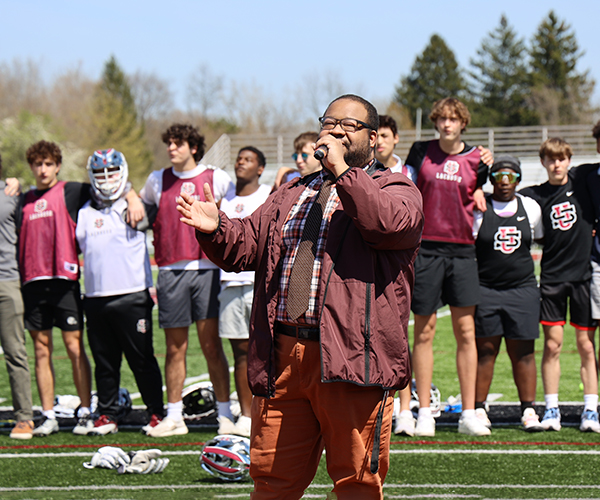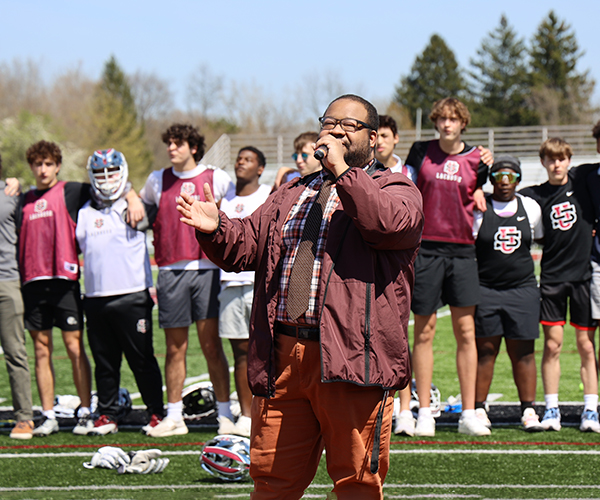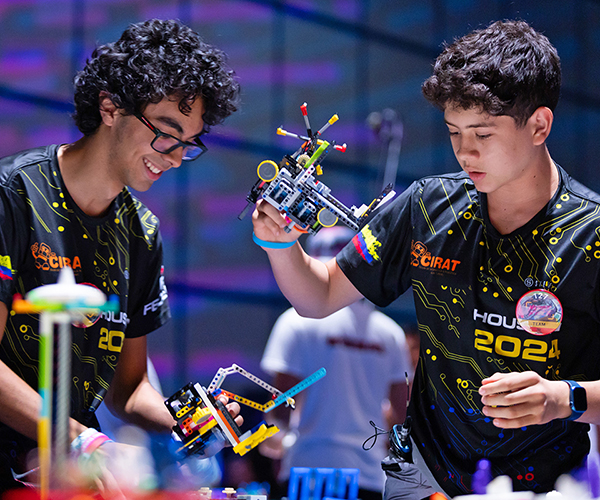Q: Why is middle school a good time to start cultivating student leadership skills?
A: "Middle school students are very open and giving. They are really concerned about making the world a better place," says Yvonne Saunders, director of middle school at Gilmour Academy. "Middle school students in particular need to develop the courage to stand up for what they know is right. In training students to make decisions based on values, we are hoping that they will make better choices in college, and that perhaps our students will be able to have the courage and values to put other people's needs before their own."
Q: Why is it important to establish a connection with nature early in a child's development?
A: "Children are full of wonder about nature, and it is just the perfect age to begin what really is a lifelong lesson about taking care of the natural environment," says Jane Thornton, director of the pre-primary school at Laurel School. "At a very young age children are able to understand a lot about how they can take care of their natural environment, and it's something that they are quite proud of. I think there is a great deal of concern about the health of our environment, and the earlier you start with children, the better off they are. It just becomes part of their daily routine."
Q: Why should students learn about global diversity and global citizenship starting at a young age?
A: "Patterns of thought and how to interpret knowledge is established at a very early age," says Larry Goodman, head of The Lillian and Betty Ratner School. "If you can have students thinking from other outlets, it can become second nature later on in life. If the students are taught to think with an open mind and develop the right framework for other cultural perspectives, they can benefit by becoming a better learner, student and citizen."
Q: Why is it important that schools foster independent thinking and exploration in young children?
A: "It's important that we allow independence to develop in children from when they are 3 or 4 years old," says Tina Schneider, director of the Montessori School at Holy Rosary. "Here, students are expected to choose their own work. They're not only taking out and doing an activity, but they're also cleaning it up. They show respect for the environment and one another. As they enter adolescence, they're able to work with experts in various fields and branch out into the community beyond their own classroom."
Q: Why is music education an important part of a child's early learning?
A: "It's important for getting the left and right brain to work together," says Thea Wilson, director of early childhood education at The Music Settlement. "It permits the child to experiment with sound, with patterns, truly without being wrong. And that's an issue with some children; they have to be right. We try to get them to just enjoy it. It utilizes the unique gifts and capabilities of children. It develops and strengthens interpersonal connections. The bottom line is, it improves the individual's quality of life."
Q: What are some options for children with learning differences?
A: "We often say that differences are not disabilities," says Courtney Baker, communications director for Lawrence School. "Learning disabilities unintentionally implies that a person has a general deficit in learning as a whole. We know that this is not the case. Rather, students with learning differences are just as intelligent, and can learn just as quickly and effectively as other students — if they are taught in a way that best suits their unique learning styles. The key is to place those unique learners in an environment that uses creative yet structured learning techniques."
Q: What must high schools do to best prepare 21st-century students for the future?
A: "Students need to be able to be creative and innovative," says Marilyn Knox Arundel, dean of faculty and academics at Magnificat High School. "These students are going to face problems that we don't even know yet. They need to be good problem-solvers and think outside the box. We have to allow students to be risk-takers, to ask questions with no right answers. The role of the teacher should be bringing students' learning to life. We do this by integrating new things into the curriculum, changing it as we see the need."
Q: How is technology being used in the modern classroom to help enhance a students educational
experience?
A: "Technology has opened up a lot of new doors to our students," says Ryan S. Wooley, director of technology, library, and media services for Hawken School. "By allowing every student in the room to work on a problem simultaneously and research or create content instantly, the student becomes the center of attention. It opens up a much bigger window into how students are learning. When every student in the classroom has a laptop, they are able to learn more actively. Students have all the tools they need now to be producers of information instead of just receivers."
Q: How are schools balancing between academic rigor and building community?
A: "When children learn together, they in turn grow together, challenge each other and learn to appreciate each other and the community in which they live. There is no better place for community to be developed than in a thriving academic environment," says Sarah Johnston, director of admission and financial aid at Hathaway Brown. "Our Legacy program championing service, sisterhood and spirit brings together the entire school community multiple times a year in order to give back to the Cleveland community through service. Our youngest students work side by side with middle and upper school students to collaborate on projects."
Q: Why are curiosity and creativity becoming increasingly important skill sets for today's students?
A: "When students enter what is becoming an increasingly global workforce or competitive college experience, it's important that students are able to think critically and creatively to deal with everyday situations," says Sarah Moore, co-director of admissions at Lake Ridge Academy. "The ability to understand different viewpoints, master different concepts and apply them using those critical-thinking skills in any setting really means that they will be more successful. People are not successful because they simply regurgitate information, they're successful because they're able to analyze the material given and connect the dots."
Q: Why is developing a sense of community in students an important part of high school education?
A: "The high school years go by very quick, and they are formative years for our young men," says Kieran Patton, director of advancement and admissions at Benedictine High School. "They should be encouraged to get involved. We like them to join as many of our teams and clubs as they can, and try to reach a leadership role."
Q: What are the benefits of boarding at the school you attend?
A: "When you live in a boarding environment, you learn to live as a part of a community and manage yourself to be a part of the whole," says Paula Leigh-Doyle, head of school at Hershey Montessori School. "Students practice what it means to be a citizen in an adult-like setting. Boarding programs allow for freedom and respect in a safe setting. The desire to be more independent and practice who they will be as adults happens more easily when they are away from immediate family."
Q: How can a college counselor help students find the right fit for a university?
A: "Counselors know that it's a little daunting for students when they begin the college search," says Catherine Sylstra, director of college counseling at Andrews Osborne Academy. "There's a big push for students to go to college because they've been trained to think that way. So it's important for counselors to analyze the student's skill level and give them the right direction. Counselors really help break up the process for the students, whether it's focusing on test scores, GPA or applications. Sometimes counselors have to be the voice of realism when students are looking at potential schools."
Q: What type of student thrives at a small school and why?
A: "The ideal profile of our student is a one with above-average grades and who is involved. Students in a small school have the opportunity to participate in various things from athletics to student government. We also find that students from suburban areas and small towns thrive," says Lake Erie College president Michael Victor. "[At a small school] you get a lot of individualized attention — small classes mean you have access to your teachers. People want you to succeed. You also get to know more people at a small school."
Q: Why are more students becoming interested in sustainability as a course of study?
A: "Where five or 10 years ago the sustainability movement seemed a shallow fad, it has now become a permanent trend that is spreading widely," says David Krueger, head of sustainability programs at Baldwin-Wallace College. "Companies across industries are embracing this change and realizing they need to get their initiatives started. All a student needs to do is read a newspaper to see that something has happened in the public consciousness. It's in their self-interest to understand these problems and become effective problem-solvers."
Q: What is the benefit to students who complete their bachelor's degree at LCCC's University Partnership?
A: "LCCC's University Partnership provides a clear, affordable pathway to bachelor's degrees," says John Crooks, associate provost of Lorain County Community College's University Partnership program. "After earning an associate's degree at LCCC, students can stay on the LCCC campus and earn a bachelor's degree and even a master's degree. The University Partnership, the first of its kind in Ohio, increases opportunities for our students and creates collaborative relationships with universities in our state."
Q: What can a student do to ensure that a university is a good fit?
A: "Students in high school don't invest enough time to research what it is about a university that will best fit their interest and skills," says David Garcia, associate vice president for enrollment management at Kent State University. "The biggest issue to consider when selecting a university is if the school has the student's desired major or field of interest. The student needs to ask themselves, •What is it I want to get out of this school?' And they should be able to see themselves here for four years."



